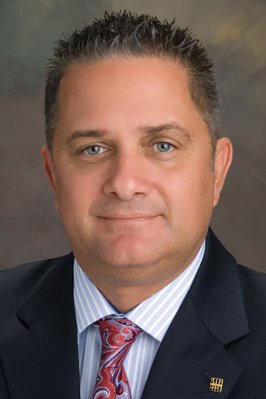Make 2020 a time to disconnect and engage
From the Executive Director, Wesley Smith
January 13, 2020

commit to “disconnecting and engaging”
? If our quiet time — reading, reflection, rest, etc. — is important to us, we can put down our phones and engage the quiet. If our leisure time is important to us, we can put down our phones and engage the activity. And by all means, if the people around us are important, we can put down our phones and actively, meaningfully engage them. Being present is not only good for us, it is good for our relationships.
Many of you know I suffered a heart attack and a full cardiac arrest in 2016. Shortly thereafter I started researching wellness and mindfulness, and I even put together a presentation to share what I had learned.
At the North State Conference, where I first shared my presentation, I was met at the front of the stage by the wife of one of our members with her superintendent husband in tow.
“Tell him that part about disconnecting and engaging again,” she demanded.
“Which part specifically?” I asked.
“All of it. Last week we were at our daughter’s volleyball tournament and, after the tournament, she told my husband she wished he could have seen her play. He told her he did and that he was there the whole time. She fired back at him, ‘No you weren’t! You were on your phone the whole time. If you were really there you would have been paying attention to me and not your phone.’”
Let’s pick a time when we are away from work to put our cell phones out of reach. Let’s let our staffs know that after that determined time, we will not be reading emails or texts, and they should not expect us to read theirs either.
Putting down our cell phones and being present is a pretty broad, difficult goal that would probably find us in the 8 percent success group. The Navy Seals teach their soldiers to set short-term, manageable goals that allow them to succeed and grow their confidence and capacity. In his newest book, Professor BJ Fogg teaches that tiny habits are small things that have the ability to change everything.
With that in mind, let’s break the goal down into tiny, manageable habits. Let’s pick a time when we are away from work to put our cell phones out of reach. Let’s let our staffs know that after that determined time, we will not be reading emails or texts, and they should not expect us to read theirs either (certainly they can call us if there is an emergency, but, even then, let’s clearly define emergencies).
As this activity becomes a habit, let’s put it away an hour earlier until we find that sweet spot that allows us to be effective at our work and appropriately present in our activities and relationships away from work.
If we need support, and we often do as we try to create a new habit, we can enlist a friend/ally. Because I needed help after my heart attack, my wife would take my cell phone from me every night at the agreed upon time and not give it back until the next morning. When not looking at it became a habit, she trusted me to put it away. Now if it is out during family time, she and my kids know I am not working.
Changing behaviors isn’t easy. When I slide back into old phone habits, I remind myself what my son told me. He told me a year or so after my heart attack that our relationship was the best it had ever been because I listen more. I am not so sure I listen any more, but I am certainly working to be intentionally present.
Whatever goals or resolutions you have, I hope 2020 brings you wellness and joy.


